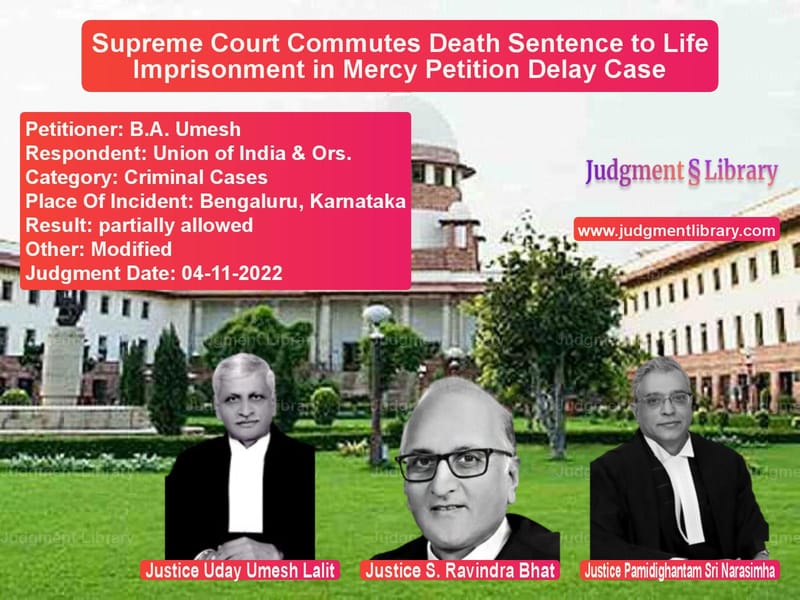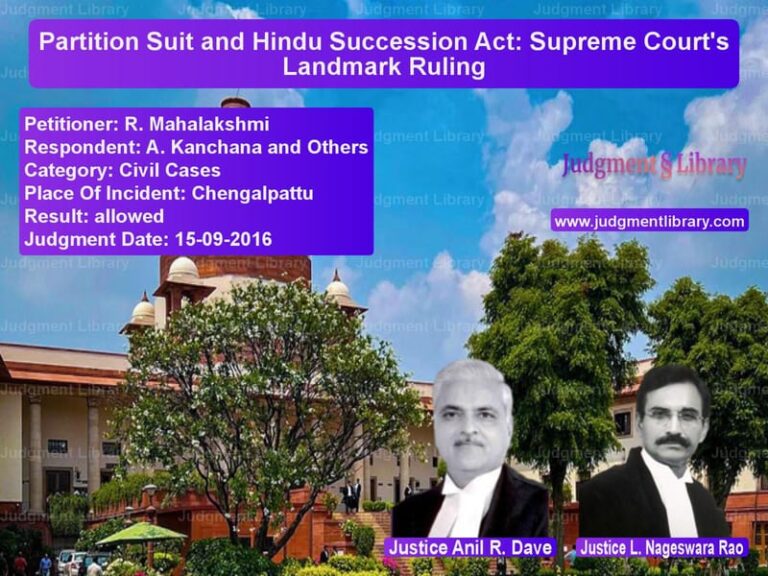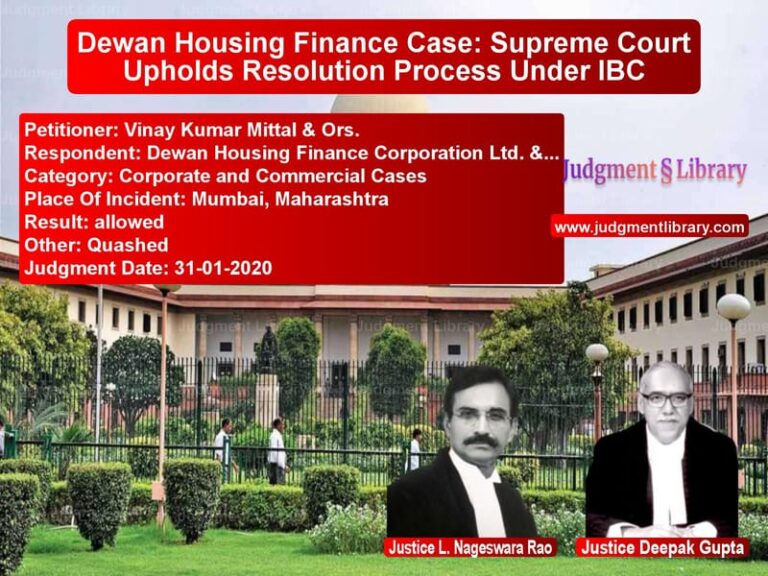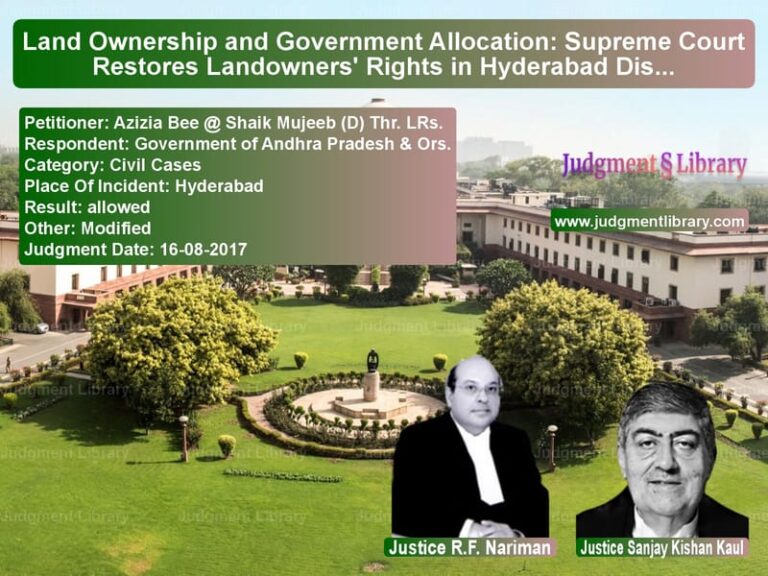Supreme Court Commutes Death Sentence to Life Imprisonment in Mercy Petition Delay Case
The Supreme Court of India recently ruled on a highly significant case, B.A. Umesh v. Union of India & Ors., dealing with the delay in deciding a mercy petition and its impact on a death sentence. The appellant, convicted for rape and murder, sought commutation of his death sentence to life imprisonment due to inordinate delay in the disposal of his mercy petition and his prolonged solitary confinement.
Background of the Case
The appellant, B.A. Umesh, was convicted of raping and murdering a woman in Bengaluru in 1998. The Trial Court sentenced him to death in 2006, a decision later confirmed by the High Court and the Supreme Court in 2011. After exhausting all judicial remedies, he filed a mercy petition before the President of India, which was rejected in 2013.
The appellant then approached the High Court, challenging the rejection of his mercy petition, citing an inordinate delay of over two years and three months in deciding the plea. Additionally, he alleged that he had been kept in solitary confinement for nearly a decade, violating his fundamental rights. The High Court dismissed his petition, prompting him to approach the Supreme Court.
Legal Issues Before the Court
The Supreme Court had to consider the following key legal questions:
- Whether the delay in deciding the mercy petition was excessive and justified commutation of the death sentence.
- Whether the prolonged solitary confinement of the appellant violated his rights under Article 21 of the Constitution.
- Whether the appellant’s incarceration conditions were in line with judicial standards for death row prisoners.
Petitioner’s Arguments
The appellant, through his counsel, argued:
- The delay of 827 days in disposing of the mercy petition was unjustifiable and violative of the principles laid down in Shatrughan Chauhan v. Union of India and Triveniben v. State of Gujarat.
- He was kept in solitary confinement from 2006 to 2016, which was illegal and contrary to the Supreme Court’s ruling in Sunil Batra v. Delhi Administration.
- His psychological condition deteriorated due to prolonged solitary confinement, making his continued incarceration on death row cruel and unconstitutional.
- The delay was caused entirely by the authorities, and he should not be penalized for it.
Respondent’s Arguments
The Union of India and the State of Karnataka, representing the respondents, countered:
- The delay was not inordinate given the procedural formalities involved in processing mercy petitions.
- The mercy petition was considered diligently at both the state and central levels before being rejected.
- The appellant was not subjected to illegal solitary confinement, and his incarceration conditions were in line with prison regulations.
- The rejection of the mercy petition was a well-reasoned decision based on the gravity of the crime.
Supreme Court’s Observations
The Supreme Court carefully examined the arguments and judicial precedents on the matter. The Court made the following key observations:
- The delay of over two years in deciding the mercy petition, while not the longest recorded, was significant enough to warrant reconsideration of the death penalty.
- The appellant was indeed kept in solitary confinement for a prolonged period, which was contrary to the law laid down in Sunil Batra and other landmark judgments.
- Prolonged solitary confinement, especially for a prisoner under a pending mercy petition, has a severe psychological impact and is a valid ground for commutation.
- Considering the combined impact of the delay and solitary confinement, the death sentence should be commuted to life imprisonment.
Supreme Court’s Verdict
The Supreme Court, in a judgment delivered by Chief Justice Uday Umesh Lalit and Justices S. Ravindra Bhat and Pamidighantam Sri Narasimha, ruled:
- “Considering the entirety of facts and circumstances, we hold that while commuting the death sentence to life imprisonment, the appellant shall serve a minimum of 30 years in prison.”
- “If any application for remission is moved on his behalf, the same shall be considered on its own merits only after he has served 30 years.”
- “If no remission is granted, the sentence of imprisonment for life shall mean till the remainder of his life.”
The Court also suggested modifying the rules related to the filing of mercy petitions to avoid anomalous situations where a convict is required to file a mercy plea before exhausting judicial remedies.
Legal Principles Reaffirmed by the Judgment
This judgment reinforces several key legal principles:
- Delay in Mercy Petition Disposal: Any inordinate delay in deciding a mercy petition can be a ground for commutation of the death penalty.
- Protection Against Solitary Confinement: Keeping death row prisoners in prolonged solitary confinement is unconstitutional and violative of their rights.
- Judicial Review of Executive Clemency: The President and Governor’s decisions on mercy petitions can be challenged if they violate fundamental rights.
- Commutation to Life Imprisonment: Even in heinous crimes, if procedural lapses occur, courts have the authority to convert a death sentence into life imprisonment with conditions.
Implications of the Judgment
The Supreme Court’s ruling has significant implications for death row convicts and the criminal justice system:
- It establishes a stricter standard for handling mercy petitions, ensuring timely disposal.
- It provides clarity on the legal consequences of solitary confinement for death row inmates.
- It reiterates that procedural fairness and humane treatment of prisoners are essential aspects of justice.
- It highlights the necessity of reforming mercy petition guidelines to align with judicial principles.
Conclusion
The Supreme Court’s decision in B.A. Umesh v. Union of India & Ors. serves as a critical precedent in capital punishment jurisprudence. By commuting the death sentence to life imprisonment due to procedural lapses, the Court has reinforced the importance of fair legal procedures in the administration of justice. The ruling also underscores the need for prison reforms, ensuring that convicts are not subjected to inhumane treatment while awaiting execution.
Petitioner Name: B.A. Umesh.Respondent Name: Union of India & Ors..Judgment By: Justice Uday Umesh Lalit, Justice S. Ravindra Bhat, Justice Pamidighantam Sri Narasimha.Place Of Incident: Bengaluru, Karnataka.Judgment Date: 04-11-2022.
Don’t miss out on the full details! Download the complete judgment in PDF format below and gain valuable insights instantly!
Download Judgment: b.a.-umesh-vs-union-of-india-&-ors-supreme-court-of-india-judgment-dated-04-11-2022.pdf
Directly Download Judgment: Directly download this Judgment
See all petitions in Murder Cases
See all petitions in Rape Cases
See all petitions in Bail and Anticipatory Bail
See all petitions in Custodial Deaths and Police Misconduct
See all petitions in Judgment by Uday Umesh Lalit
See all petitions in Judgment by S Ravindra Bhat
See all petitions in Judgment by P.S. Narasimha
See all petitions in partially allowed
See all petitions in Modified
See all petitions in supreme court of India judgments November 2022
See all petitions in 2022 judgments
See all posts in Criminal Cases Category
See all allowed petitions in Criminal Cases Category
See all Dismissed petitions in Criminal Cases Category
See all partially allowed petitions in Criminal Cases Category







